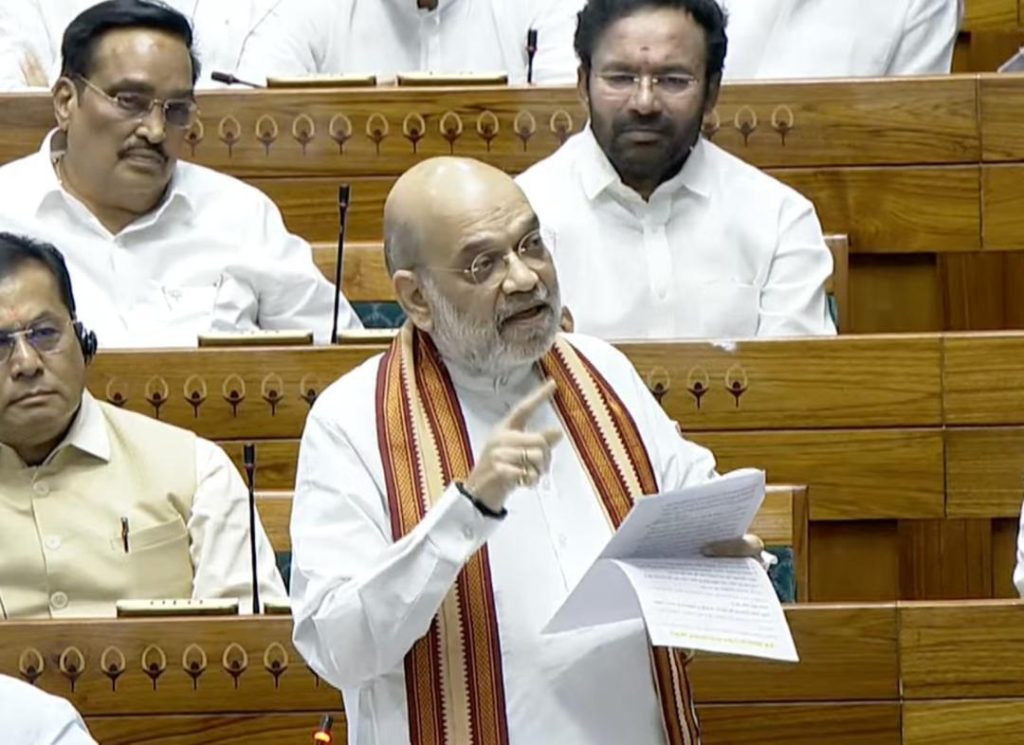
Title: What did J&K locals arrested for housing Pahalgam terrorists tell government?
The recent arrest of two Jammu and Kashmir locals for providing shelter to terrorists involved in the Pahalgam attack has raised several questions about the extent of support local populations have been extending to militant groups in the region. The Union Home Minister, Amit Shah, shared details of the encounter in the Lok Sabha, revealing that the terrorists had reached the local’s hut, situated 2km from the Baisaran Valley, on April 21.
According to Shah, the terrorists were armed with AK-47 and M9 Carbine, and two of them were dressed in black outfits. During their stay, they consumed food, tea, and took some essential items like salt, chillies, and spices before leaving. The Minister’s statement has sparked concerns about the potential risks and implications of local civilians providing shelter to militants.
The Pahalgam attack, which occurred on April 12, left several people injured and resulted in the death of one person. The incident has been attributed to the Lashkar-e-Taiba (LeT) terrorist outfit, which has been known to operate in the region. The arrest of the two locals has been seen as a significant breakthrough in the investigation, as it has led to the recovery of crucial evidence and provided insight into the modus operandi of the terrorists.
The question that arises from Shah’s statement is what did the arrested locals tell the government about their encounter with the terrorists? Did they provide any information about the terrorist group’s plans, their movements, or their hideouts? What motivated them to provide shelter to the militants, and what was their relationship with the terrorist outfit?
The answers to these questions are crucial in understanding the complex dynamics between local populations and militant groups in Jammu and Kashmir. For decades, the region has been plagued by insurgency, with various militant outfits fighting for independence or greater autonomy. The conflict has resulted in the loss of thousands of lives, displacement of communities, and widespread human rights violations.
One of the primary reasons for the persistence of militancy in Jammu and Kashmir is the lack of economic opportunities and political representation for the local population. Many young people in the region feel disillusioned with the political process and see militancy as a means to challenge the status quo and bring about change. The presence of militant groups also provides a sense of security and protection for local populations, particularly in areas where the government’s presence is limited.
The arrested locals’ sheltering of terrorists can be seen as a manifestation of this complex dynamic. It is possible that they were motivated by a desire to support their community or family members who may have been involved with the militant group. Alternatively, they may have been coerced or intimidated into providing shelter to the terrorists.
The government’s response to the Pahalgam attack and the subsequent arrest of the locals has been swift and decisive. The security forces have launched a massive operation to track down and neutralize the terrorist outfit responsible for the attack. The government has also announced various measures to improve the security situation in the region, including the deployment of additional troops and the implementation of stricter security protocols.
However, the problem of local populations supporting militant groups runs deeper than just the provision of shelter. It is a symptom of a broader issue related to the political and economic marginalization of the region. The government must address these underlying issues if it wants to effectively tackle militancy and restore peace to Jammu and Kashmir.
The arrested locals’ testimonies could provide valuable insights into the terrorist outfit’s plans and operations. The government must ensure that they are treated fairly and humanely, and that their testimony is used to build a strong case against the terrorist group. The prosecution must also ensure that the evidence collected is admissible in court and that the trial is conducted in a fair and transparent manner.
In conclusion, the arrest of the two Jammu and Kashmir locals for housing Pahalgam attack terrorists has shed light on the complex dynamics between local populations and militant groups in the region. The government must address the underlying issues of political and economic marginalization if it wants to effectively tackle militancy and restore peace to Jammu and Kashmir. The arrested locals’ testimonies could provide crucial information about the terrorist outfit’s plans and operations, and the government must ensure that they are treated fairly and humanely.
News Source:
https://www.youtube.com/watch






